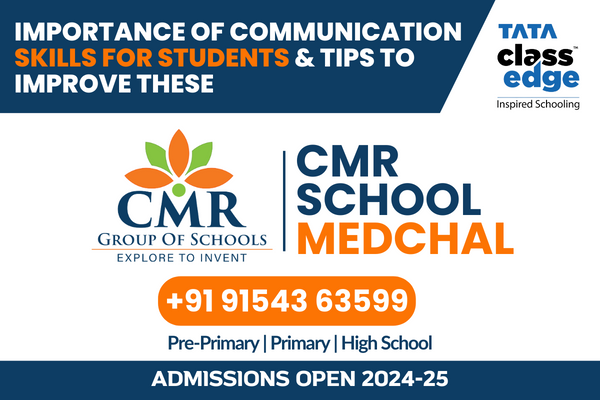Communication skills are essential for success in school, relationships, and future careers. At CMR School Medchal, we recognize the significance of developing strong communication skills in students to prepare them for the challenges and opportunities they will encounter in life. In this article, we’ll explore the importance of communication skills for students and provide practical tips to help them improve these skills effectively.
Understanding the Importance of Communication Skills
Effective communication skills play a crucial role in various aspects of students’ lives:
- Academic Success: Communication skills are vital for academic success as they enable students to express their ideas clearly, participate in class discussions, ask questions, and collaborate with peers on projects and assignments.
- Social Relationships: Strong communication skills facilitate positive social interactions and relationships with peers, teachers, family members, and other members of the community. They promote empathy, understanding, and effective conflict resolution.
- Career Readiness: In today’s competitive job market, employers value candidates with strong communication skills. These skills are essential for job interviews, networking, team collaboration, client interactions, presentations, and written correspondence.
- Critical Thinking and Problem-Solving: Effective communication involves not only expressing oneself but also listening actively, analyzing information, synthesizing ideas, and engaging in meaningful dialogue. Communication skills are integral to critical thinking and problem-solving abilities.
Tips to Improve Communication Skills
Now, let’s explore some practical tips to help students improve their communication skills:
Verbal Communication
- Practice Public Speaking: Encourage students to practice public speaking by participating in class presentations, debates, or speech competitions. Provide opportunities for constructive feedback and coaching to build confidence and fluency.
- Active Listening: Teach students the importance of active listening by paying attention, maintaining eye contact, asking clarifying questions, and paraphrasing information. Practice active listening skills through group discussions, role-playing, and reflective exercises.
- Expand Vocabulary: Encourage students to expand their vocabulary by reading widely, using a dictionary or thesaurus, and learning new words in context. Engage in vocabulary-building activities such as word games, vocabulary journals, and word of the day challenges.
Written Communication
- Develop Writing Skills: Foster students’ writing skills by providing opportunities for regular writing practice, such as journaling, creative writing assignments, essays, and research papers. Teach them the importance of clear organization, grammar, punctuation, and formatting.
- Peer Editing and Revision: Incorporate peer editing and revision exercises into writing assignments to help students refine their written communication skills. Encourage them to provide constructive feedback to their peers and revise their own work based on feedback received.
- Use Technology Tools: Integrate technology tools such as word processors, grammar checkers, and plagiarism detectors to support students’ writing process and improve the quality of their written communication.
Nonverbal Communication
- Body Language Awareness: Raise students’ awareness of nonverbal cues such as facial expressions, gestures, posture, and tone of voice. Discuss how body language can enhance or detract from effective communication and practice conveying messages through nonverbal means.
- Role-Playing Activities: Conduct role-playing activities to help students practice interpreting and responding to nonverbal cues in different social situations. Encourage them to pay attention to body language and practice adjusting their own nonverbal communication accordingly.
Interpersonal Communication
- Develop Empathy: Teach students the importance of empathy in interpersonal communication by helping them understand others’ perspectives, feelings, and experiences. Encourage them to practice empathy through active listening, perspective-taking, and supportive responses.
- Conflict Resolution Skills: Provide students with strategies for resolving conflicts and disagreements constructively, such as using “I” statements, active listening, finding common ground, and seeking win-win solutions. Role-play conflict scenarios and discuss effective resolution strategies.
Conclusion
In conclusion, communication skills are indispensable for students’ academic success, social relationships, and future career prospects. By focusing on verbal communication, written communication, nonverbal communication, and interpersonal communication, students can develop the essential skills they need to thrive in today’s interconnected world. At CMR School Medchal, we are committed to providing students with opportunities to enhance their communication skills and prepare them for success in all aspects of their lives.
FAQ’s :
- Why are communication skills important for students?
Communication skills are crucial for students as they facilitate academic success, social relationships, and future career opportunities. Effective communication enables students to express themselves clearly, collaborate with others, and navigate various situations effectively. - What are the key components of communication skills?
The key components of communication skills include verbal communication, written communication, nonverbal communication, and interpersonal communication. Each component plays a vital role in conveying messages effectively and building relationships. - How can students improve their verbal communication skills?
Students can improve their verbal communication skills by practicing public speaking, active listening, expanding their vocabulary, and participating in group discussions and debates. Practice and feedback are essential for developing fluency and confidence in verbal communication. - What are some strategies for improving written communication skills?
Strategies for improving written communication skills include regular writing practice, peer editing and revision, using technology tools, and focusing on clarity, organization, grammar, and punctuation. Reading widely and analyzing different writing styles can also enhance writing proficiency. - How can students enhance their nonverbal communication skills?
Students can enhance their nonverbal communication skills by paying attention to body language, gestures, facial expressions, and tone of voice. Role-playing activities, observation exercises, and feedback from peers can help students become more aware of nonverbal cues and their impact on communication. - Why is empathy important in interpersonal communication?
Empathy is important in interpersonal communication as it enables individuals to understand and connect with others’ emotions, perspectives, and experiences. Empathetic communication fosters trust, mutual respect, and positive relationships. - What role does active listening play in effective communication?
Active listening is essential for effective communication as it involves fully engaging with the speaker, understanding their message, and providing appropriate responses. Active listening demonstrates respect, empathy, and attentiveness, leading to clearer communication and better relationships. - How can students improve their conflict resolution skills?
Students can improve their conflict resolution skills by learning strategies such as using “I” statements, active listening, finding common ground, and seeking win-win solutions. Role-playing conflict scenarios and practicing negotiation techniques can help students develop confidence and effectiveness in resolving conflicts. - Are communication skills important for academic success?
Yes, communication skills are important for academic success as they enable students to express their ideas clearly, participate in class discussions, collaborate on group projects, and communicate effectively with teachers and peers. Strong communication skills contribute to better comprehension, critical thinking, and overall academic performance. - How can parents and educators support students in improving their communication skills?
Parents and educators can support students in improving their communication skills by providing opportunities for practice, offering constructive feedback, modeling effective communication, and incorporating communication skills development into the curriculum. Encouraging reading, discussion, and real-world application of communication skills also contributes to improvement.
Admissions are now open for the 2024-25 academic year at CMR School Medchal. Contact us today to enroll your child and give them the tools they need to communicate effectively and confidently.
For admissions, contact us at +91 9154363599 or visit www.cmrschool.in.




